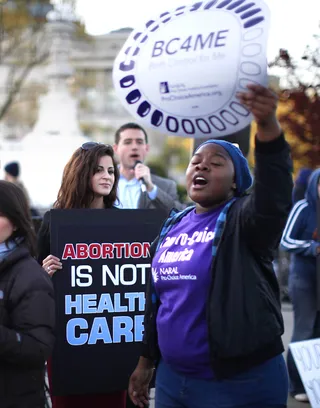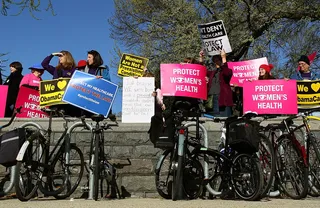The Affordable Care Act on Trial
The High Court upholds Obama's law in a 5-4 ruling.

1 / 14
Health Care Reform on the Line - BET.com takes a look back at the evolution of the Affordable Care Act and the high court's ruling upholding President Obama's landmark law. — Joyce Jones and Britt Middleton(Photo: REUTERS/Jason Reed)
Photo By Photo: REUTERS/Jason Reed

2 / 14
Health Care Reform Heads to the Supreme Court - On March 26, the U.S. Supreme Court began a historic three-day session after which the nine justices began deliberating the fate of the ACA, President Obama’s signature domestic achievement. Arguments centered on the constitutionality of requiring individuals to purchase health insurance or be penalized, and whether the law can stand on its own without the individual mandate.(Photos: Mark Wilson/Getty Images; REUTERS/Jonathan Ernst)

3 / 14
Americans Divided - Demonstrators for and against the health care reform law made their cases outside the Supreme Court building. Supporters say the law saves lives and everyone pays for the uninsured’s health care costs. Opponents argue that government should not be allowed to force individuals to buy anything. Where would it end? they ask.(Photo: Mark Wilson/Getty Images)
Photo By Photo: Mark Wilson/Getty Images

4 / 14
Has the Law Affected My Coverage So Far? - Your plan may now cover preventive services, such as mammograms, without charging co-pays or deductibles. Adult children can stay on their parents’ plans until age 26, and lifetime limits on what a provider will pay for your care may have been eliminated.(Photo: Jonathan Ernst/Reuters)

5 / 14
Who Would the Individual Mandate Affect? - According to an Urban Institute analysis, approximately 26 million uninsured people could be required to purchase insurance, about 11 million would be eligible for subsidies, and eight million would be eligible for Medicaid or low-cost children’s health insurance programs.(Photos: Mark Wilson/Getty Images; Alex Wong/Getty Images)
ADVERTISEMENT

6 / 14
In the Beginning... - The mandate requiring individuals to purchase health insurance or pay a penalty doesn’t kick in until 2014. Day 1 was devoted to whether, based on the Anti-Injunction Act of 1867, the penalty assessed for people who don’t buy insurance is a tax, which Solicitor General Donald Verrilli Jr. argued it is not. Another question posed was whether it was premature to argue for or against something that has not yet gone into effect.(Photo: AP Photo/Dana Verkouteran)

7 / 14
Opening Arguments - On Day 2, Solicitor General Verrilli argued that everyone needs medical services at some point in their lives, and the ACA addresses a critical economic issue by putting in place reforms that would make it affordable for everyone to purchase insurance. Attorney Paul Clement, arguing for the states, said the mandate “represents an unprecedented effort by Congress to compel individuals to enter commerce in order to better regulate commerce.”(Photo: REUTERS/Art Lien)

8 / 14
Brain Freeze - Faced with intensive questioning by skeptical justices, the solicitor general struggled to make his case, so much so that reporters in the courtroom speculated that his bungling performance may have put the ACA on life support.(Photo: AP Photo/Dana Verkouteren)

9 / 14
Varying Judicial Reactions - Justice Ruth Bader Ginsburg lent Verilli a hand by explaining how the cost of medical services for the uninsured are passed on to the insured. Justice Samuel Alito, responding to the argument that everyone at some point visits a doctor, said that everyone dies, too, so should we all be forced to buy burial insurance?(Photo: Chip Somodevilla/Getty Images)

10 / 14
Medicaid a Top Issue - The final day of court focused on whether the health care reform law can survive if the individual mandate is struck down and if the law’s use of Medicaid, a voluntary program, unfairly forces states to participate.(Photos: Mark Wilson/Getty Images; Chip Somodevilla/Getty Images)
ADVERTISEMENT

11 / 14
Justices Respond - “If you take the heart out of the statute, the statute’s gone. That enables Congress to do what it wants in the usual fashion,” said Justice Antonin Scalia.(Photo: AFP PHOTO/ART LIEN/Getty Images)

12 / 14
All Done - On June 28 in a 5-4 decision the Supreme Court ruled in favor of the much-contested mandate in President Obama's sweeping health-care act requiring all individuals to have health insurance. Scheduled to go into effect in 2014, the mandate will also make insurance coverage more affordable by spreading the risk for insurance companies, the Obama administration has said. (Photo: AP Photo/Pablo Martinez Monsivais)

13 / 14
A Victory for All Americans - Following the Supreme Court's ruling, President Obama called the vote "a victory for people all over this country," adding that provisions in the Affordable Care Act will lower insurance premiums while giving 30 million uninsured Americans access to quality, affordable health care. "With today’s announcement, it’s time for us to move forward — to implement and, where necessary, improve on this law," he said.(Photo: REUTERS/Luke Sharrett)
